美国日常生活用语
美国日常生活中常见的美式俚语解答

美式英语中有许多独特的词语、短语、流行语,就像我们的蓝瘦香菇一样,初到美国的你,乍一看绝壁会让人一头雾水。
不必担心,今天就为大家准备了一份指南——教你绝地反击啊!问候和表达在美国,有许许多多表达“你好”的用语,更不用说那些表达个人感受的词语了。
熟记并使用以下语句,与当地人轻松交流。
Hey, y’all! (大家好!此问候语常见于美国南部,Y’all是you的一种复数形式)Howdy(你好。
这是区域性用语,常见于德克萨斯州、俄克拉荷马州和大平原地区) What’s up? (How are you?——你好吗?)That sucks/that’s beat (That is bad——糟透了)Chillin’(Not doing much, relaxing——没干什么事情,挺轻松的)Hang out (Spend time with someone/relax in a certain place——与某人共度时光/在某个地方放松休息)Wicked(真的。
这是区域性用语,常见于马萨诸塞州的波士顿地区——“that party was wicked good!”)Awesome (Great——棒极了)Cool (Nice/great——不错/好极了)Having a blast (Having a really good time –“I had a blast in my English class”——度过了一段美好时光)That’s sick! (That’s really good——真是太棒啦!)Filthy (Seattle slang for good –“You got an A in the paper? That’s filthy!”——西雅图俚语“好”)Sweet (Nice——不错)You bet! (Yes——是的)To take off (To leave –“We‘re taking off now”——离开)See ya! (Goodbye——再见)Laters! (Goodbye——再见)服饰Pants (Trousers——裤子)Panties (Female underwear——女式内裤)Underpants (Male underwear——男士内裤)Sweater (Jumper/pullover/jersey——针织套衫/套头毛衣/毛线衫)Vest (Waistcoat——马甲)Undershirt (Vest——汗衫)Sneakers (Trainers——运动鞋)Suspenders (Braces——吊带)Galoshes (Wellington boots——橡胶套鞋)Turtleneck (Polo neck——高领毛衣)Bathing suit (Swimming costume——泳装)Bath robe (Dressing gown——浴袍)Diaper (Nappy——尿布)食物和饮料Cotton candy (Candy floss——棉花糖)Candy (Chocolate/sweets——巧克力/糖果)Cookie (Sweet biscuit——甜饼干)Biscuit (Savoury scone——美味烤饼)Soda (Fizzy drink. Can also be pop or Coke depending on the region——碳酸饮料,部分地区用来指汽水或可乐)Chips (Crisps——薯片)Jelly (Jam——果酱)Jell-O (Jelly——果冻)Cilantro (Coriander——香菜)Flapjack (Can mean a pancake——可用来指薄烤饼)Popsicle (Ice lolly——冰棍)Zucchini (Courgette——西葫芦)Eggplant (Aubergine——茄子)Appetizer (Starter——开胃菜)Take out (Take away food——外卖食物)Get the check (Ask for the bill in a restaurant——在餐馆买单)人物、地点和生活方式Chick (Girl——女生)Dude (Boy——男生)Redneck/hick (A derogatory term for someone who lives in a rural area——贬义词,用来指生活在农村地区的人)Wheels (A vehicle, usually a car——交通工具,通常指汽车)Parking lot (Place to park cars——停车场)Sidewalk (Pavement——人行道)Soccer (Football——足球)Football (American football——橄榄球)Elevator (Lift——电梯)金钱在美国,有许多词语可以用来指口袋里的钱。
40句美国人常说的英语口语

【导语】英语在⽣活和就业中的重要性已经越来越显著了,⽇常⼝语交际的常⽤语是⼤家必须掌握的。
⽆忧考为⼤家准备了相关的英⽂⼝语锦集,⼀起来看看吧!更多相关讯息请关注⽆忧考!1. My time is your time. 请你吩咐!2. My hands are tied. 我很忙,⽆能为⼒。
3. To make a long story short. 长话短说。
4. It’s a date. ⼀⾔为定。
5. That's a steal. 真便宜。
6.She has no sense. 她不懂事。
7. It's not a big deal. 没什么了不起。
8. What's the fuss? 吵什么?9. Don't push me. 别逼我。
10. Have a good of it. 玩得⾼兴。
11.Go down to business. ⾔归正传。
12. Does it serve your purpose? 对你有⽤吗?13. It’s long story. ⼀⾔难尽。
14. Don't play possum. 别装蒜!15. Make it up. 不计前嫌。
16. Don't over do it. 别太过分了。
17. You want a bet? 想打赌吗?18. Who wants? 谁稀罕?19. December heartbeat. 黄昏恋。
20. Follow my nose. 凭直觉21. Cheap skate. ⼩⽓⿁!22. Big mouth. 多嘴。
23. I'm going to go. 我这就去。
24. can-do 能⼈25. Leave me alone. 别理我。
26. Don't pass the buck. 不要推卸责任。
27. I can't put up with her. 我受不了她。
美国惯用语.美国口语1-50
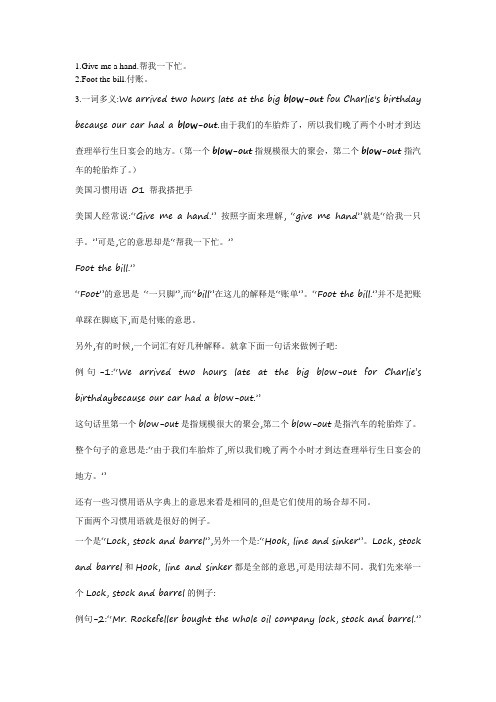
1.Give me a hand.帮我一下忙。
2.Foot the bill.付账。
3.一词多义:We arrived two hours late at the big blow-out fou Charlie's birthday because our car had a blow-out.由于我们的车胎炸了,所以我们晚了两个小时才到达查理举行生日宴会的地方。
(第一个blow-out指规模很大的聚会,第二个blow-out指汽车的轮胎炸了。
)美国习惯用语01 帮我搭把手美国人经常说:“Give me a hand.” 按照字面来理解, “give me hand”就是“给我一只手。
”可是,它的意思却是“帮我一下忙。
”Foot the bill.”“Foot”的意思是“一只脚”,而“bill”在这儿的解释是“账单”。
“Foot the bill.”并不是把账单踩在脚底下,而是付账的意思。
另外,有的时候,一个词汇有好几种解释。
就拿下面一句话来做例子吧:例句-1:“We arrived two hours late at the big blow-out for Charlie’s bir thdaybecause our car had a blow-out.”这句话里第一个blow-out是指规模很大的聚会,第二个blow-out是指汽车的轮胎炸了。
整个句子的意思是:“由于我们车胎炸了,所以我们晚了两个小时才到达查理举行生日宴会的地方。
”还有一些习惯用语从字典上的意思来看是相同的,但是它们使用的场合却不同。
下面两个习惯用语就是很好的例子。
一个是“Lock, stock and barrel”,另外一个是:“Hook, line and sinker”。
Lock, stock and barrel 和Hook, line and sinker都是全部的意思,可是用法却不同。
我们先来举一个Lock, stock and barrel的例子:例句-2:“Mr. Rockefeller bought the whole oil company lock, stock and barrel.”这句话的意思是:“洛克菲勒先生把整个石油公司买了下来”。
美国习惯用语
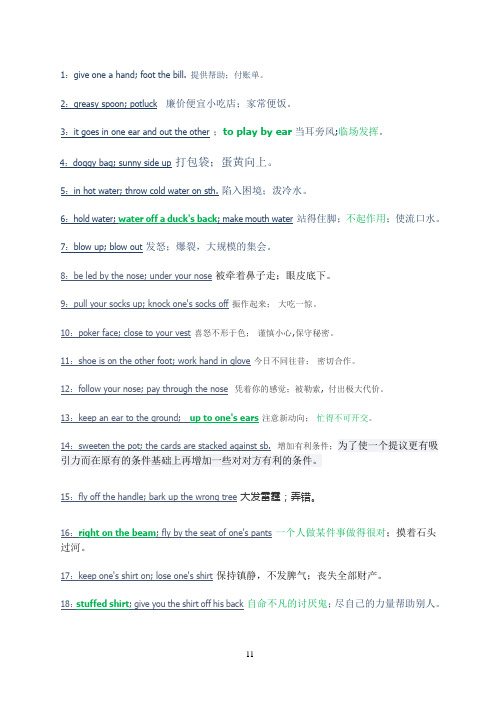
1:give one a hand; foot the bill. 提供帮助;付账单。
2:greasy spoon; potluck廉价便宜小吃店;家常便饭。
3:it goes in one ear and out the other;to play by ear当耳旁风;临场发挥。
5:in hot water; throw cold water on sth.陷入困境;泼冷水。
6:hold water; water off a duck's back; make mouth water站得住脚;不起作用;使流口水。
7:blow up; blow out发怒;爆裂,大规模的集会。
8:be led by the nose; under your nose被牵着鼻子走;眼皮底下。
9:pull your socks up; knock one's socks off振作起来;大吃一惊。
10:poker face; close to your vest喜怒不形于色;谨慎小心,保守秘密。
11:shoe is on the other foot; work hand in glove今日不同往昔;密切合作。
12:follow your nose; pay through the nose凭着你的感觉;被勒索, 付出极大代价。
13:keep an ear to the ground; up to one's ears注意新动向;忙得不可开交。
14:sweeten the pot; the cards are stacked against sb.增加有利条件;为了使一个提议更有吸引力而在原有的条件基础上再增加一些对对方有利的条件。
15:fly off the handle; bark up the wrong tree大发雷霆;弄错。
16:right on the beam; fly by the seat of one's pants一个人做某件事做得很对;摸着石头过河。
美国最地道最高频的300习惯用语

美国最地道最高频的300习惯用语1.Haveaniceday.祝你今天愉快2.Sofar,sogood.目前为止一切都好3.Takeitorleaveit.要就要,不要就拉倒4.Keepitup!继续努力,继续加油5.Goodforyou.好啊!做得好!6.Timeflies!时光如梭7.Timeismoney.时间就是金钱8.That'slife.这就是人生9.Nowyou'retalking.这才对嘛10.havebutterfliesinone'sstomach紧张11.Youaskedforit.你自找的12.readbetweenthelines字里行间的言外之意13.Therestishistory.众所皆知14.Alittlebirdtoldme.我听说的15.Itneverrainsbutitpours.祸不单行16.Mindyourownbusiness.不关你的事儿17.Hanginthere.坚持下去18.couldbeworse可能更糟19.Moneytalks.金钱万能20.countmeout不要算我21.Overmydeadbody!想都别想(除非我死了)22.gofifty-fiftyonsth.平分23.Youcansaythatagain!Yousaidit!你说的没错;你说对了24.Lookwho'stalking!看看你自己吧!25.It'sGreektome.这我完全不懂26.takemywordforit相信我的话27.notone'scupoftea不感兴趣;不合胃口28.Getreal!别闹了;别开玩笑了29.headoverheels深陷;完全地30.Suityourself.随你高兴31.What'sthecatch?有什么意图?32.letthecatoutofbag泄漏秘密33.sth.istouchandgo危险的情况;惊险的;一触即发的34.beatadeadhorse白费劲35.Thesky'sthelimit.没有限制36.onceinabluemoon千载难逢;难得一次37.Beprepared.准备好38.It'seasiersaidthandone.说的比做的简单39.havesecondthoughts考虑一下;犹豫40.behindsomeone'sback在某人背后;背着某人41.Betterlucknexttime.下次运气更好einhandy派得上用场43.rainscatsanddogs倾盆大雨44.Firstcome,firstserved.先来先招待;捷足先登45.It'snotmyday!今天运气真糟46.That'snewstome.这可是新闻呢47.There'snowaytotell.没办法知道48.readsb.likeanopenbook清楚某人心里的想法49.You'vegotmethere.你考到我了50.Easydoesit.慢慢来;小心一点;别生气了51.onthetipofone'stongue差一点就说出口;差一点就记起来的52.Themore,themerrier.越多越好53.letsomeoneoffthehook让某人摆脱麻烦、解脱困境54.besidethepoint离题的;不是重点55.burnthecandleatbothends白天晚上都要忙;花费很多精力56.meetadeadline截稿57.outofsight,outofmind眼不见为净;离久情疏58.rubsomeonethewrongway惹恼某人59.stoponone'stoes触怒到某人60.befedupwith对……感到厌烦61.givecreditwherecreditisdue.称赞该被赞美的人62.gofrombadtoworse每况愈下63.hitthejackpot中大奖,走运64.Italldependsonwhatonemeansbysth.看某人对于……是指什么意思65.accidentally/onpurpose不小心/故意66.inone'sbook在某人的字典里;对……而言67.Nopains,nogains一份耕耘,一份收获68.Youain'tseennothingyet.你还没看过更好(烂)的69.togivearaincheck改天的邀请70.That'swhatfriendsarefor.这就是好朋友啊71.It'sapainintheneck.很讨厌而难避免72.It'sthethoughtthatcounts.心意最重要73.thetipfotheiceberg冰山一角;危险的细微的征兆74.jumpdownsomeone'sthroat粗暴地回答某人;无理地打断某人的话75.savesth.forarainyday以备不时之需76.behindthescenes在幕后;在黑暗中77.bytheskinofone'steeth刚好,勉强,侥幸78.Don'trocktheboat.不要破坏现状、捣乱79.worthitsweightingold很有价值的80.speakfothedevil说曹操曹操到81.rightup/downsomeone'salley某人的专长82.Youneverknowwhatyoucandountilyoutry.不试试看,就不知道自己的潜力83.Youscratchmyback,andI'llscratchyours.你帮我,我也帮你84.Apennysavedisapennyearned.省一分就是赚一分85.getawayfromitall远离这一切86.makeamountainoutofamolehill大惊小怪;小题大做;言过其实87.Twoheadsarebetterthanone.三个臭皮匠抵过一个诸葛亮88.get/havecoldfeet紧张89.havesomeone'ssightonsth.看好了某样东西;决心要90.Honestyisthebestpolicy诚实为上策91.Nosoonersaidthandone.说做就做92.sleeplikealog睡得很沉93.throughthickandthin共同经历94.allintheday'swork习以为常;不足为奇95.Curiositykilledthecat.好奇伤身96.Greatmindsthinkalike.英雄所见略图97.Somepeopleneverlearn.有些人总是学不乖98.There'snoplacelikehome.没有比家更温暖的地方99.Youlearnsth.neweveryday.你每天都会学到新东西/知道新事情100.wrapthingsup把事情整理一番,做个结束101.atthedropofahat立即,随时102.Beautyisonlyskindeep.美丽是肤浅的103.Ittakestwototango.一个巴掌拍不响104.Neverputoffuntiltomorrowwhatyoucandotoday.今日事,今日毕105.Somepeoplehavealltheluck.有些人就是那么幸运106.Don'tbesuchapoorloser.不要输不起107.Don'tcryoverspiltmilk.覆水难收108.Itwouldn'thurttoask.问人又不会怎么样109.haveone'sheadintheclouds心不在焉110.Neversaydie.决不要灰心111.seeingisbelieving眼见为实112.Patienceisavirtue.耐心是一种美德113.Talkischeap.光说没有用114.turnoveranewleaf重新开始115.burnthemidnightoil挑灯夜战116.grinandbearit默默忍受;忍耐着点117.sametoyou同样祝福你118.sth.isbetterthannothing有总比没有强119.Oppositesattract.异性相吸120.Thefeelingismutual.有同感121.thecalmbeforethestorm暴风雨前的宁静122.Theearlybirdcatchestheworm早起的鸟儿有虫吃123.Betterleftunsaid.最好还是不要说124.Tomorrowisanotherday.明天又是崭新的一天eoutinthewash真相大白;得到圆满的结果126.Everydoghashisday.十年风水轮流转127.burythehatchet言归于好;和好128.Agoodmanishardtofind.好人难找129.inthenickoftime及时130.Don'tspeaktoosoon.别说的太早131.There'snosuchthingasafreelunch.天下没有免费的午餐132.withoutbattinganeyelid眼眨都不眨;泰然自若133.knowtheropes知道学习规则或内容134.paythroughthenose花很多钱135.selllikehotcakes很畅销136.What'sdoneisdone.做了就做了137.Lookbeforeyouleap.三思而后行138.Whenthechipsaredown.在重要关头;到了关键时刻139.betone'sbottomdollar确信无疑140.Varietyisthespiceoflife.多样化丰富生活141.awolfinsheep'sclothing披着羊皮的狼142.Hastemakeswaste.欲速则不达143.likeabullinachinashop笨手笨脚;莽撞行事144.someoneisnotoutofthewoodsyet还未脱离危险145.Thebestthingsinlifearefree.生命中最好的东西是金钱买不到的146.Easycome,easygo.来得快,去得快147.Idon'thaveaclue.我不知道148.Bettersafethansorry.宁愿安全(可靠)也不要后悔149.Practicemakesperfect.孰能生巧150.forcryingoutloud哎呀呀!拜托151.onthespurofthemoment一时冲动;一时兴起152.Everylittlebitcounts.一点一滴都算153.drivesb.tothewall使某人发疯/受不了;使某人束手无策154.getsth.offone'schest倾吐心中的事;落下心中的大石头155.Twowrongsdon'tmakearight.报复于事无补156.theblindleadingtheblind外行领导外行157.inthesameboat同命相连158.Appearancescanbedeceiving.外表是会骗人的159.onlytimewilltell只有时间会证明160.Don'tputallyoureggsinonebasket.别孤注一掷161.takethegoodwiththebad好的与坏的都要一起接受162.takethebullbythehorns当机立断;大胆果断地解决问题163.That'sthelaststraw.使人无法忍受的最后一击164.Youcan'tpleaseeveryone.你无法使每一个人都满意165.Aneyeforaneye,andatoothforatooth.以眼还眼,以牙还牙166.Moneydoesn'tgrowontrees.金钱得来不易167.costsb.anarmandaleg花大笔钱168.havetheupperhand占优势169.everythingbutthesink所有的东西170.Boyswillbeboys.男孩就是男孩171.Notbeabletogetawordinedgewise.插不上话172.gobacktosquareone回到原地173.It'snevertoolatetolearn.学习永远不嫌晚;亡羊补牢犹未晚174.Leavewellenoughalone.维持现状;对现在已经很满意了,不用变更175.onafirst-namebasis直呼其名(很熟的)176.Nothingtowritehomeabout.没什么值得说的;不值得推荐177.packedinlikesardines挤得要命178.Thereareotherfishinthesea.天涯何处无芳草;还有别的机会179.Whatyouseeiswhatyouget.你看到什么就是什么eoutsmellinglikearose一枝独秀181.hearthroughthegrapevine听到谣言182.readyouloudandclear听得很清楚;很了解你183.haveasweettooth喜欢甜食(喜欢某物)184.knowsb.likethebackofone'shand很了解某人185.It'snottheendoftheworld.不是世界末日eawayempty-handed一无所获187.breathedownsomeone'sneck紧跟在某人后面;监督某人188.costsb.aprettypenny很贵189.fillsomeone'sshoes接替某人的职位190.actthemustard达到标准191.likeadreamcometrue如梦成真192.zeroinonsth.专注于;对准(两个介词并用,奇怪)193.put/laysth.ontheline坦白的说,冒……风险194.likeafishoutofwater感到尴尬不适应195.Allsystemsarego.准备好了。
american idioms的例子
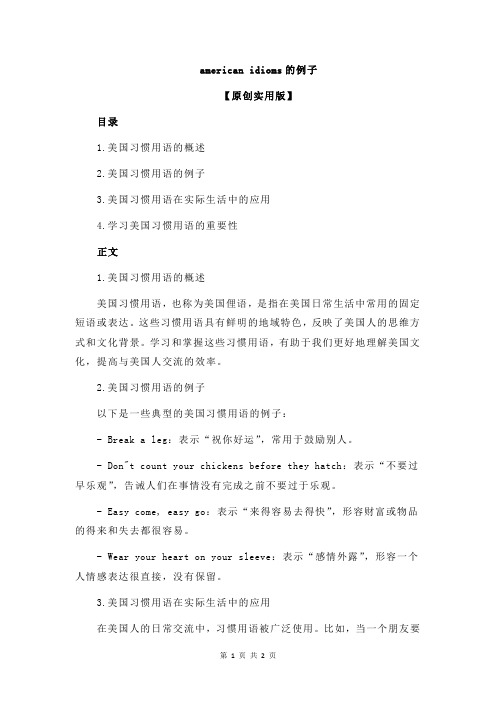
american idioms的例子【原创实用版】目录1.美国习惯用语的概述2.美国习惯用语的例子3.美国习惯用语在实际生活中的应用4.学习美国习惯用语的重要性正文1.美国习惯用语的概述美国习惯用语,也称为美国俚语,是指在美国日常生活中常用的固定短语或表达。
这些习惯用语具有鲜明的地域特色,反映了美国人的思维方式和文化背景。
学习和掌握这些习惯用语,有助于我们更好地理解美国文化,提高与美国人交流的效率。
2.美国习惯用语的例子以下是一些典型的美国习惯用语的例子:- Break a leg:表示“祝你好运”,常用于鼓励别人。
- Don"t count your chickens before they hatch:表示“不要过早乐观”,告诫人们在事情没有完成之前不要过于乐观。
- Easy come, easy go:表示“来得容易去得快”,形容财富或物品的得来和失去都很容易。
- Wear your heart on your sleeve:表示“感情外露”,形容一个人情感表达很直接,没有保留。
3.美国习惯用语在实际生活中的应用在美国人的日常交流中,习惯用语被广泛使用。
比如,当一个朋友要去参加面试,你可以用“Break a leg”来鼓励他;在别人过于乐观时,你可以用“Don"t count your chickens before they hatch”来提醒他。
这些习惯用语可以让你的表达更加地道和生动,也有助于拉近彼此的距离。
4.学习美国习惯用语的重要性随着全球化的发展,中美之间的交流越来越频繁。
掌握一些美国习惯用语,可以帮助我们更好地融入美国的社交场合,避免因为文化差异而产生的误解。
此外,学习这些习惯用语还有助于提高我们的英语水平,使我们在阅读、听力和写作等方面取得更好的成绩。
总之,美国习惯用语作为美国文化的一个重要组成部分,值得我们去学习和了解。
美国人日常生活常用语
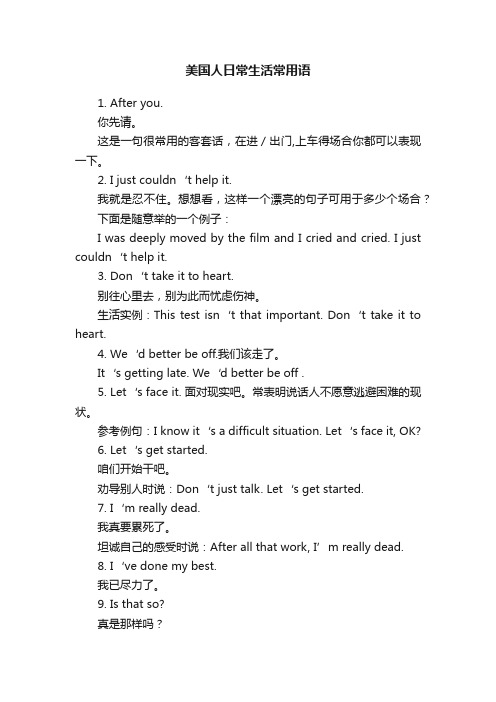
美国人日常生活常用语1. After you.你先请。
这是一句很常用的客套话,在进/出门,上车得场合你都可以表现一下。
2. I just couldn‘t help it.我就是忍不住。
想想看,这样一个漂亮的句子可用于多少个场合?下面是随意举的一个例子:I was deeply moved by the film and I cried and cried. I just couldn‘t help it.3. Don‘t take it to heart.别往心里去,别为此而忧虑伤神。
生活实例:This test isn‘t that important. Don‘t take it to heart.4. We‘d better be off.我们该走了。
It‘s getting late. We‘d better be off .5. Let‘s face it. 面对现实吧。
常表明说话人不愿意逃避困难的现状。
参考例句:I kn ow it‘s a difficult situation. Let‘s face it, OK?6. Let‘s get started.咱们开始干吧。
劝导别人时说:Don‘t just talk. Let‘s get started.7. I‘m really dead.我真要累死了。
坦诚自己的感受时说:After all that work, I’m really dead.8. I‘ve done my best.我已尽力了。
9. Is that so?真是那样吗?常用在一个人听了一件事后表示惊讶、怀疑。
10. Don‘t play games with me!别跟我耍花招!11. I don‘t know for sure.我不确切知道。
Stranger: Could you tell me how to get to the town hall?Tom: I don‘t know for sure. Maybe you could ask the policeman over there.12. I‘m not going to kid you.我不是跟你开玩笑的。
美国口语惯用语
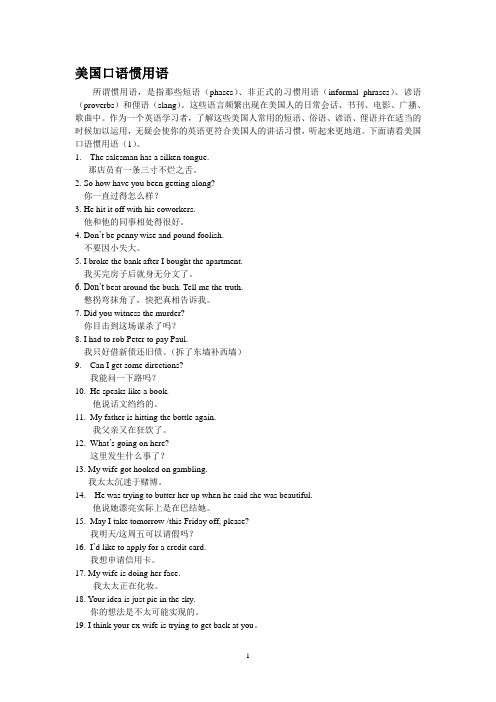
美国口语惯用语所谓惯用语,是指那些短语(phases)、非正式的习惯用语(informal phrases)、谚语(proverbs)和俚语(slang)。
这些语言频繁出现在美国人的日常会话、书刊、电影、广播、歌曲中。
作为一个英语学习者,了解这些美国人常用的短语、俗语、谚语、俚语并在适当的时候加以运用,无疑会使你的英语更符合美国人的讲话习惯,听起来更地道。
下面请看美国口语惯用语(1)。
1.The salesman has a silken tongue.那店员有一条三寸不烂之舌。
2. So how have you been getting along?你一直过得怎么样?3. He hit it off with his coworkers.他和他的同事相处得很好。
4. Don’t be penny wise and pound foolish.不要因小失大。
5. I broke the bank after I bought the apartment.我买完房子后就身无分文了。
6. Don’t beat around the bush. Tell me the truth.憋拐弯抹角了,快把真相告诉我。
7. Did you witness the murder?你目击到这场谋杀了吗?8. I had to rob Peter to pay Paul.我只好借新债还旧债。
(拆了东墙补西墙)9.Can I get some directions?我能问一下路吗?10.He speaks like a book.他说话文绉绉的。
11.My father is hitting the bottle again.我父亲又在狂饮了。
12.What’s going on here?这里发生什么事了?13. My wife got hooked on gambling.我太太沉迷于赌博。
14. He was trying to butter her up when he said she was beautiful.他说她漂亮实际上是在巴结她。
- 1、下载文档前请自行甄别文档内容的完整性,平台不提供额外的编辑、内容补充、找答案等附加服务。
- 2、"仅部分预览"的文档,不可在线预览部分如存在完整性等问题,可反馈申请退款(可完整预览的文档不适用该条件!)。
- 3、如文档侵犯您的权益,请联系客服反馈,我们会尽快为您处理(人工客服工作时间:9:00-18:30)。
美國日常生活用語1. After you.你先请。
2. I just couldn't help it.我就是忍不住。
想想看,这样一个漂亮的句子可用于多少个场合?下面是随意举的一个例子:I was deeply moved by the film and I cried and cried. I just couldn't help it.3. Don't take it to heart. 别往心里去,别为此而忧虑伤神。
生活实例:This test isn't that important. Don't take it to heart.4. We'd better be off.我们该走了。
It's getting late.5. Let's face it. 面对现实吧。
参考例句:I know it's a difficult situation. Let's face it, OK?6. Let's get started.咱们开始干吧。
劝导别人时说:Don't just talk. Let's get started.7. I'm really dead.我真要累死了。
坦诚自己的感受时说:After all that work, I'm really dead.8. I've done my best.我已尽力了。
9. Is that so?真是那样吗?常用在一个人听了一件事后表示惊讶、怀疑。
10. Don't play games with me!别跟我耍花招!11. I don't know for sure.我不确切知道。
12. I'm not going to kid you. I'm serious.我不是跟你开玩笑的。
13. That's something.太好了,太棒了。
A: I'm granted a full scholarship for this semester. B: Congratulations. That's something.14. Brilliant idea!这主意真棒!这主意真高明!15. Do you really mean it?此话当真?Michael:Whenever you are short of money, just come to me. David: Do you really mean it?16. You are a great help.你帮了大忙17. I couldn't be more sure. 我再也肯定不过。
18. I am behind you.我支持你。
A: Whatever decision you're going to make, I am behind you.19. I'm broke.我身无分文。
20. Mind you!请注意!听着!(也可仅用Mind。
) 模范例句:Mind you! He's a very nice fellow though bad-tempered.21. You can count on it.你尽管相信好了,尽管放心。
22. I never liked it anyway.我一直不太喜欢这东西。
当朋友或同事不小心摔坏你的东西时就可以用上这句话给他一个台阶,打破尴尬局面:Oh, don't worry. I'm thinking of buying a new one. I never liked it anyway.23. That depends.看情况再说。
例:I may go to the airport to meet her. But that depends.24. It's a deal.一言为定Harry:Haven't seen you for ages. Let's have a get-together next week. Jenny: It's a deal英语文雅的表达骂人1. Hey!wise up!放聪明点好吗?Hey! grow up.2. Put up or shut up.要么你就去做,不然就给我闭嘴。
3. walk the walk, talk the talk,即说到做到4. You eat with that mouth?你是用这张嘴吃饭的吗?5. "You kiss your mother with that mouth?"你用这张脏嘴亲你妈妈吗?6. You are dead meat.你死定了。
也可以说:"You are dead."你完蛋了。
Don't you dare!How dare you!你好大的胆子啊!常见中文俗语英译技巧许多中国人爱用俗语、成语、俚语。
由于中美两国文化、风俗、思想、习惯的差异,如果照字直译,或把单字"堆在一起",老外听了,也许就会"满头雾水"、"迷迷糊糊",成了他们所说的"只有你们中国人听得懂"的"中国英语(Chinese English)"。
在此,把一些常见的中文俗语与一般老外的说法相对比较,或许可供有兴趣的读者参考。
1、人山人海:有人直译为:People mountain people sea. 这就是"中国英文",老外很难理解。
他们指"人多"时,通常只说:"There is a large crowd of people."如果看到电影院门前大排长龙,也只说:"There is (was) a long movie line."不过在诗词用语(poetic expression)里,老外也有使用:"a (the) sea of faces",颇有咱的"人山人海"的味道。
例如:Looking out upon the sea of faces, Mr. A delivered a touching speech.(望着一片人山人海的听众,A先生发表一篇动人的演说。
)Standing at his podium, President Clinton saw a sea of faces waving at him.(克林顿总统站在讲台上看到人山人海的人群挥手向他致意。
)。
可见,说话者通常要在台上或高处,才有"人海"的感觉。
因此,可以说:"I saw a sea of faces from the top of the building. "但在平地的人群中,就不说:"I saw the sea of faces."也不说:"There is a sea of faces."只说:"I saw a large crowd of people."2、家家有本难念的经:有人译成:"Every family cooking -pot has a black spot."(意思是:每个家庭的锅子都有黑色的污点。
)这样说法,老外恐怕不能充分了解。
不过老外最常的说法是:"Many families have skeletons in the closet.(许多家庭的衣柜里都有骨骸,骨骸就是指家丑。
)";或者说:"Every family has its own source of shame. (每个家庭都有自己的丑事)";说白些,就是:"Every family has its own problem."3、天下无不散的宴席:有人直译为:"There are no feasts in the world which do not break up at last."老外听后,也许很难体会其中意义。
如果按照美语说法,也许更易理解:"All good things come to an end.(意思是:所有好的事情,总有结束的一天。
)";假如是指好友最后也有分别的一天,那么可以说:"Eventually, all bosom friends will drift apart.(bosom friend是指知心的好友)"4、平时不烧香,临时抱佛脚:有人照字直译为:"When times are easy, we do not burn theincense, but when the trouble comes, we embrace the feet of the uddha."这种说法,老外也会一知半解。
美语里一般说法是:"Worship God every day; not just in times of adversity.(要每天敬拜神,不是只在困难时。
)";对学生也可以说:"If you study hard every day, exams will not seem overwhelming.(如果你每天用功,考试就不会形成压力。
)"5、挂羊头,卖狗肉:有人照字直译为:"He advertises mutton, but sells dog's flesh."或"Hehangs up a sheep's head at the shopfront and sells dog meat."这两种译法,恐怕老外都难理解,尤其谈到"狗肉",他们更会反感,因为狗是他们最爱的宠物,不过老外倒有相近的说法:"He applied bait-and-switch factics in business.(他经商的策略是先引诱顾客来,再改变货物的品质。
)","Bait-and-switch"当名词用,也可不用连字号"This store uses bait and switch policy."或者简单的说:"Let the buyer be aware!(让消费者提高警觉)"或"Say one thing and do another."6、一言既出,驷马难追:有人译成:"One word lets slip and four horses will fail to catchit. 或A statement that once let loose cannot be caught by four galloping horses."这两种说法,中文味道嫌重,老外未必理解。
